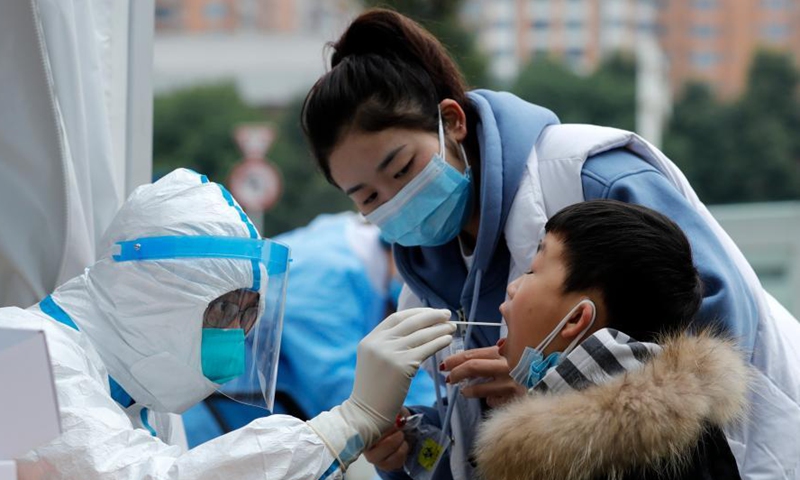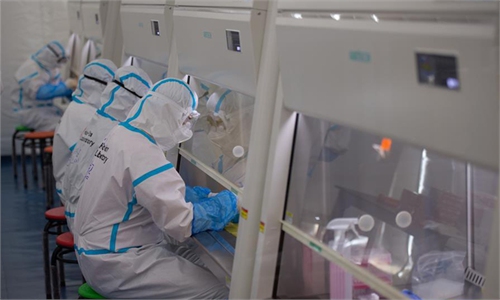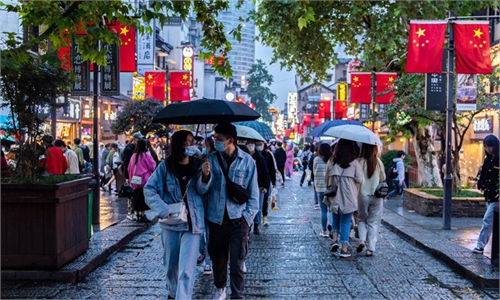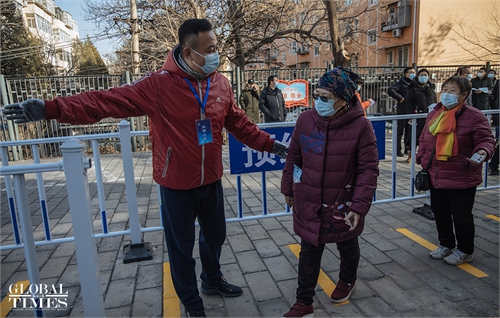Recent sporadic COVID-19 cases won't derail China's economic recovery: experts
Prevention measures may hit travel, deter consumption

A medical staff member collects a swab sample from a resident for COVID-19 test at the Pidu District Hospital of Traditional Chinese Medicine in Pidu District of Chengdu, capital of southwest China's Sichuan Province, Dec. 10, 2020. Chengdu reported zero increase in new domestically transmitted COVID-19 cases and asymptomatic cases from 9 p.m. Tuesday to 6 p.m. Wednesday, while citywide nucleic acid tests are continuing, local authorities said. At the Pidu District Hospital of Traditional Chinese Medicine, medical workers have been working 24 hours nonstop to conduct COVID-19 tests as quickly as possible. (Xinhua/Shen Bohan)
Recent sporadic COVID-19 cases in several cities including Beijing may affect local consumption, especially with regard to holiday gatherings, experts said on Sunday, while noting that the economic recovery at large would remain intact.
They based their optimism on China's effective anti-coronavirus measures that have underpinned the economy's reboot thus far and the availability of vaccines next year to beat the disease.
The Chinese mainland reported 22 new confirmed infections on Saturday, including 12 locally transmitted cases - seven in Northeast China's Liaoning Province and five in Beijing, the National Health Commission revealed on Sunday.
This followed the addition of eight domestic cases on Friday - six in Liaoning and two in Beijing.
The sporadic infections, notably in the capital city, instantly triggered local COVID-19 response mechanisms.
Over the weekend, Beijing officials ordered all districts, departments and companies to enter a state of emergency and adopt stringent measures to curb the virus' spread.
The metropolis, a major hub of passenger flows during the Spring Festival travel rush, has encouraged local residents to stay in the city over the most important Chinese festival.
There will be strict controls over travel into and out of Beijing during the upcoming New Year holiday and the Spring Festival, media reports said Sunday, citing Zhou Weimin, an official with the Beijing Municipal Bureau of Culture and Tourism.
The city calls on travel agencies and online travel firms across the country to not organize tour groups into Beijing, according to Zhou, and local agencies in Beijing are banned from organizing local people into group tours to places categorized as medium- to high-risk in coronavirus containment terms. Inbound and outbound tourism services will remain suspended.
In addition, the city's parks and scenic attractions as well as indoor public spaces such as performance venues and entertainment facilities will be allowed to operate at 75 percent capacity during the two holidays.
Beijing Happy Valley, a major amusement park, announced on Sunday it will halt nightly operations starting Monday, and it will also cancel a New Year's Eve concert originally scheduled for Thursday.
As of press time, major Chinese travel platforms including Ctrip and Mafengwo had yet to respond to the Global Times' questions about the impact on tourism and entertainment activities over the forthcoming holidays of recent sporadic infections.
A Beijing-based travel agent surnamed Cao said that fewer of his customers are willing to travel since the latest cases of coronavirus were reported in Beijing.
Cao started his agent business for medical cosmetology last year, which he said helped him make ends meet earlier this year when the travel businesses was totally suspended amid the epidemic.
The upgraded containment measures as a consequence of the few cases would have some impact on local economic activities but China is now in a much stronger position than it was when the epidemic initially hit the country, when it comes to containing and preventing the disease while ensuring the normal functioning of the economy, Bai Ming, deputy director of the Ministry of Commerce's International Market Research Institute, told the Global Times on Sunday.
In a sign that fears about disruptions to economic activities might be overblown, docking, loading and unloading operations were normal at the Dalian port in Liaoning, China Business Network reported Friday, citing a staffer at Liaoning Port Group.
But the sporadic infections will inevitably weigh on consumption, which is already lagging behind the other components of the economy - industrial production, investment and manufacturing - in recovery terms, Lian Ping, head of Zhixin Investment Research Institute, told the Global Times on Sunday.
For the whole of 2020, China's retail sales are expected to post a 3-percent contraction, according to Lian.
In the first 11 months, retail sales fell by 4.8 percent year-on-year and the reading for consumer items excluding vehicles was down 5 percent year-on-year, official data showed.
Nonetheless, without a large-scale outbreak, the virus tends to cause phased fluctuations in consumption, the economist said, reckoning public gatherings would be affected while basic consumption would be untouched.
Results of contact tracing of confirmed cases show that the virus seems to become less contagious, Lian said, adding that the mass availability of coronavirus vaccination beginning in the next year would essentially underpin consumers' confidence.
Some provinces and cities including Shanghai, Shenzhen in South China's Guangdong Province and Northwest's Shaanxi Province have begun COVID-19 vaccinations, initially for key groups of people, according to media reports.



